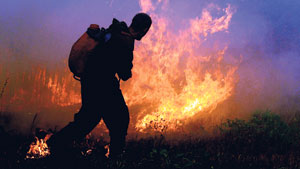Record-setting temperatures in Russia, floods in Pakistan: It's tempting to categorize these as simply fluke weather events. And many media outlets are doing just that. But to do so is a disservice to the public. Acting like ostriches won't help us solve the problem. The media should be helping to connect the dots: what seems extreme now will be tomorrow's norm if we continue to ignore that these events are harbingers of climate change, and they're patterns with real human consequences.
If Moscow were in the United States, it would be located somewhere just south of Juneau, Alaska. Yet since July 29, Muscovites have endured at least five days that have been hotter than the previous record of 99 degrees, set back in the 1920s. Prior to this summer, Moscow had never seen a day with triple-digit temperatures. Now, it's seen several.
 |
| A firefighter attempts to extinguish a fire outside the town of Shatura, some 110 km (68 miles) southeast of Moscow. Reuters |
 |
| Pakistani flood survivors evacuate a flooded area of Karampur, some 100 kilometers from Sukkur. AFP |
These are more than just a few hot days that can be endured by camping out near an air conditioner. The extreme heat -- the worst weather to occur in Russia in 1,000 years -- and the resulting acute air pollution, have caused the death rate in Moscow to double. Almost 15,000 people have died during this summer's heat wave. Wildfires are burning rampantly, releasing more carbon dioxide, the heat-trapping gas that does the most to cause climate change, into the air. A section of the Siberian tundra one-and-a-half times the size of Texas continues to thaw out.
Potentially more devastating is the effect the heat has had on Russia's grain harvest. Nearly a third of it will be lost from drought and wildfires. This loss will be felt globally; Russia is currently the world's third-largest exporter of grain, and some analysts expect its export to be halved this year, causing prices to skyrocket.
The floods in Pakistan have been equally devastating. They're "worse than the Southeast Asia tsunami... and the Haiti earthquake." About 14 million people have been affected by the flooding and several thousand have died. Villages that had yet to fully recover from a devastating 2005 earthquake have been essentially washed away. And the rain continues to pour, destroying more lives and keeping rescue efforts from proceeding. Food prices in Pakistan have quadrupled, making basic nutrition unattainable for many.
As Lester Brown explains in Plan B 4.0, climate disruption will have a devastating effect on our food supply. Two different and catastrophic weather patterns in two totally different parts of the world have resulted in the decimation of harvests and widespread food shortages.
Even after the temperature in Moscow goes down or the rain stops in Pakistan, these tragic events will continue to pile up casualties from starvation.
As grain prices rise around the world and extreme weather patterns become the norm, starvation and malnutrition, already an overwhelming problem, will become more persistent and farther reaching. The scope of climate change goes far beyond simple environmentalism — it's a fundamental question of how we power ourselves, our grid, and our economy.
The other day, I heard a news story that made reference to the "debate" on climate change.
The only "debate" is the willful deception funded by Exxon and peddled by science-denying ideologues like Sen. James Inhofe, Lord Monckton and Glenn Beck. These ideologues, for example, used last winter's vicious snowstorms in Washington, D.C., to mock those who have been pushing for strong action on climate disruption, not recognizing that those storms were another example of the weather we will soon be forced to accept as normal if we do nothing about climate disruption. While some are starting to change their tune, the media continues to give the more stubborn ideologues credence and legitimize the fallacy of their "debate."
The connection between these weather events and climate change couldn't be more unambiguous. But the mainstream media first avoided referencing climate change, when it should have been the headline. CNN, for example, at first seemed to care more about the political fallout from the Russian heat wave. Instead of simply remarking how unprecedented these weather events are, outlets should be asking why they're happening now and what it means for our future, and that means pointing readers to the many scientific studies that help contextualize this activity and show that climate destabilization will cause more extreme weather.
That's not advocacy of one viewpoint or another, it's journalism. (Despite some encouraging signs that the media has finally begun to wake up to the relationship between this summer's brutal weather and climate change, this report by the New York Times shows that some editors are still asleep at the wheel.)
We can keep our heads stuck in the sand and pretend what's happening will go away. Or we can disabuse ourselves of any responsibility, just to say "I told you so." Or we can, for once, look at what's happening now and do what's necessary to mitigate and adapt to the forces of our changing planet.
It's clear what our choice has to be.
Courtesy huffingtonpost.com |



